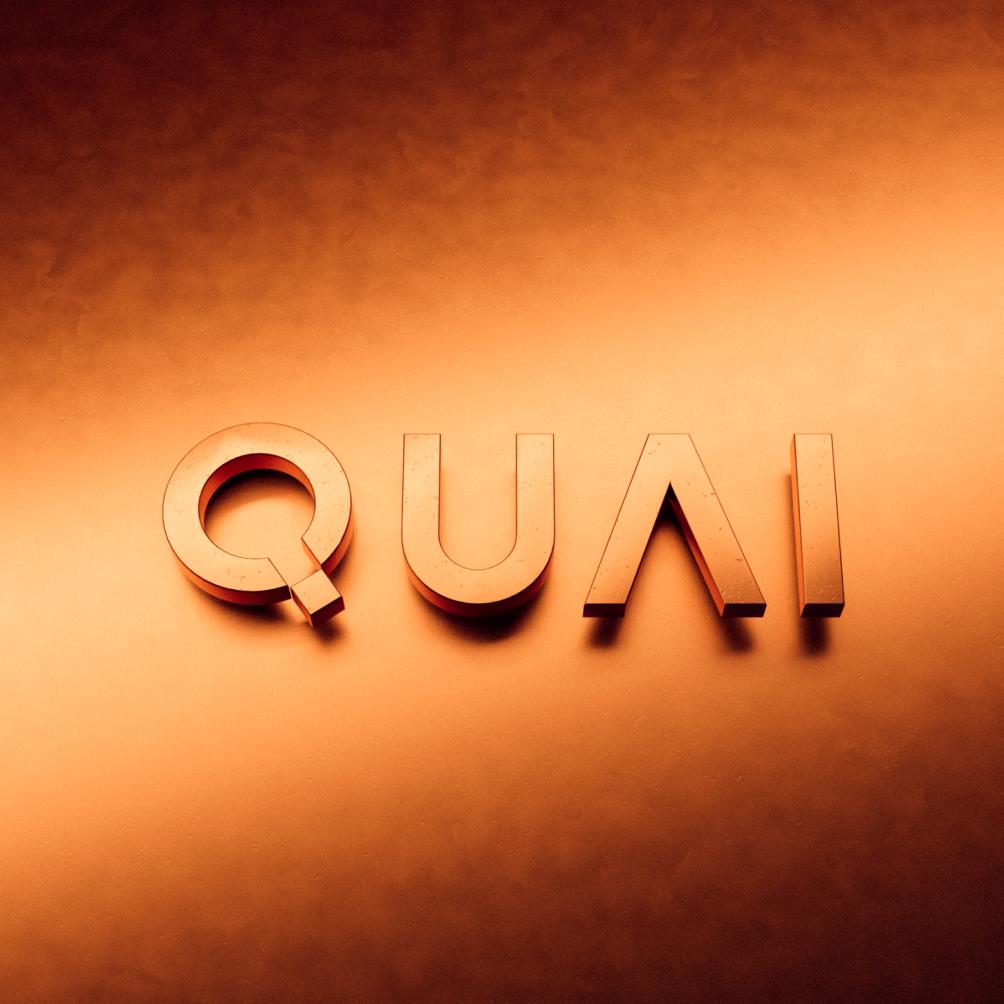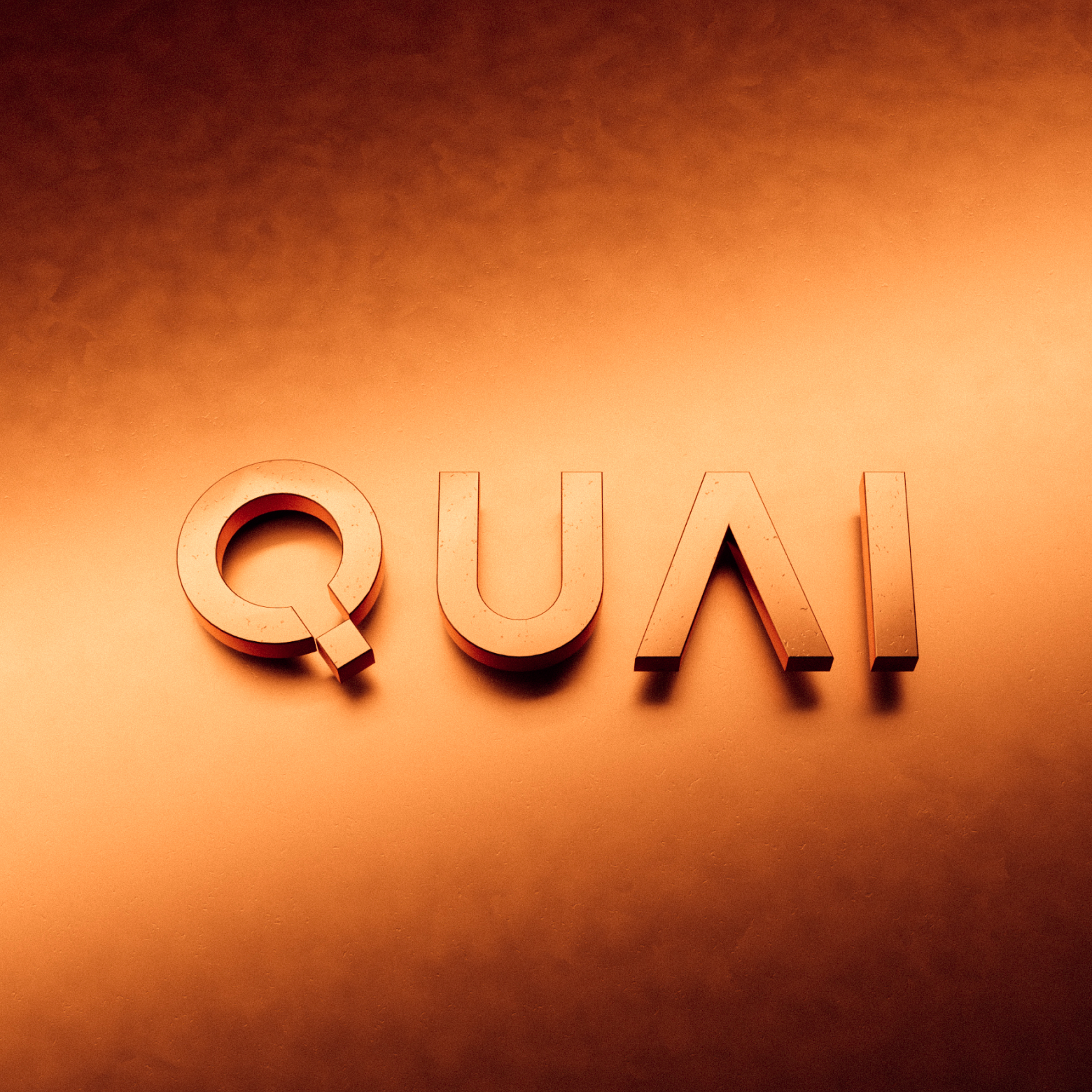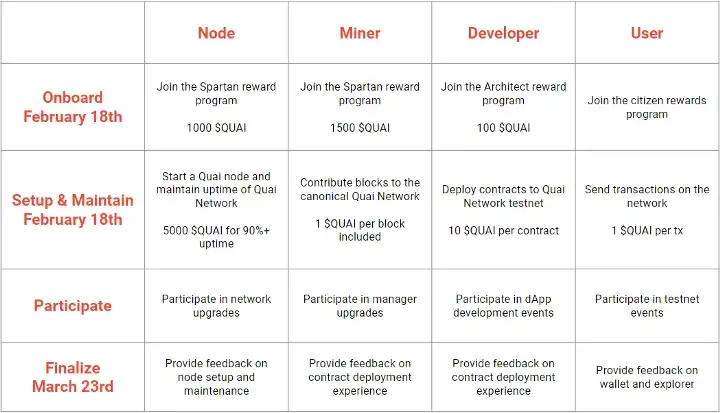
Earn $Quai for performing a variety of tasks throughout the Bronze Age Testnet, from running a node/miner to deploying smart contracts.

Bronze Age Testnet Overview
We are excited to announce the launch of the Bronze Age Testnet today, on February 18th. The Testnet is scheduled to conclude on March 23rd. This will be the second official Testnet for Quai Network, with the goal of stress-testing many new developments from the Stone Age Testnet. By taking part in the Bronze Age Testnet, you will be able to earn rewards for running a miner/node, deploying smart contracts, and sending transactions on Quai.
Some key developments you can take a look at to start are the Node/Miner Status Pages and the Quai Network Block Explorer.
Our community has grown rapidly since the last Testnet. Our team understands this, and has worked to build sufficient documentation and support channels for all participants in the Testnet — if you have any questions or difficulties with the network after reading the documentation, feel free to reach out for help in any of the support channels in our Discord.
The Bronze Age Testnet will organize participants into three roles: Spartans, Architects, and Citizens. All roles will play a crucial part in the success of the Testnet, and will be rewarded accordingly.

Spartans (Node operators & minerS)
Quai Network’s Spartans defend Quai from malicious activity and confirm legitimate transactions by running miners and nodes. To become a Spartan and receive your Discord role/rewards, you must sign up for the Spartan Draft.
To learn how to set up a node, you can either read a detailed description of how to do so, or check out our YouTube channel to watch a member of our team outline the entire process.
Setting up a miner requires Spartans to go through the process of setting up a node and wallet addresses first. To complete the process of setting up a miner, follow the YouTube/article tutorials to completion.
Spartans will be rewarded based on node/miner uptime with additional rewards for each canonical block mined. The base reward for setting up a node will be 1000 $QUAI, with an additional 5000 $QUAI to be distributed based on uptime. The base reward for setting up and maintaining a miner will be 1500 $QUAI with an additional 1 $QUAI per block mined. To receive rewards, the node/miner must be connected to the appropriate Quai Network Status pages, which is outlined in both the video and article. Quai Network will allow up to 800 Spartans to receive rewards throughout the Testnet, with each Spartan being limited to receiving rewards on three nodes each. Each Quai miner will be capped at 100,000 Mainnet $QUAI rewards, even if more blocks are mined.
Once you’ve set up your node/miner and filled out the form, check out the Spartan exclusive channels within the Quai Discord. These channels are a dedicated space for Spartans to ask for help, discuss bugs and errors, and receive direct communication on updates from the team.
It is important to note that Quai Network will still be under ongoing development throughout the Bronze Age Testnet. Miners and node operators will be expected to regularly pull updates as they are added to Quai. Failure to do so could compromise the success of the Testnet, and thus will result in forfeit of any Quai rewards.
Architects (Developers)
A nation is nothing without builders. Quai Architects are tasked with creating projects and smart contracts that turn Quai’s impressive innovations into real-life utility. To become an Architect and receive your Discord role, you must complete the Architect Signup form.
Quai Network is EVM compatible, meaning that if you know Solidity, you can already build for Quai! While Ethereum has many more developer tools given its age, Quai is primed to be a hotspot for developers looking for EVM compatibility without the high costs.
Developing on Quai Network is more difficult due to the lack of developer infrastructure. However, members of our team are actively working on forking developer tools like Truffle to simplify the process. For more assistance, we have constructed Architect-exclusive channels within the Quai Discord for both new and experienced developers to discuss ideas, collaborate, and ask for help.
As compensation for building on Quai, Architects will be rewarded with 10 $QUAI per contract they deploy. Architects are able to earn up to 5000 $QUAI in rewards throughout the duration of the Bronze Age Testnet.
Citizens (users)
Citizens do not mine or build on Quai Network, but they are essential nonetheless. The vast majority of a blockchain’s activity is from everyday users who transact on the network. Quai Network recognizes the value of these users, and will reward them for and transacting on-chain. To become a Bronze Age Citizen and receive your Discord role, you must fill out the Citizen Registration form.
As Quai is still in the very early stages, creating addresses and sending transactions requires more work than already built-out chains. To learn how to create an address and send transactions within Quai Network, you can either read this article or watch a video of our team member setting up Quai addresses on our YouTube channel.
To send Quai transactions, it is important to have Quai tokens in the first place. While the faucet is still under active development, individuals looking to get their hands on some Quai can currently ask Spartans (miners) to send them some in our dedicated discord channel!
As rewards for transacting on Quai Network, Citizens will receive 1 $QUAI per transaction sent. The rewards for Citizens are capped at 1000 $QUAI.
Timeline & further Bronze Age Testnet developments
As previously stated, Quai Network will be under continuous development throughout the Bronze Age Testnet. There are a few features that are not quite ready for Testnet release, but will be consistently worked on throughout the Bronze Age Testnet.
One of these developments will be a Quai-native wallet, built with ease of use and simplicity in mind. We hope this will allow for more seamless onboarding of users to Quai, and a more engaging experience for existing users.
Another development to look forward to is the Quai Network Faucet. A faucet for Testnet Quai is important for users to be able to send transactions and for developers to deploy contracts. However, the faucet is still under construction. In the meantime, the only way to get Quai is to mine, or get sent Quai by a miner. Drop your Quai address in the “#🤲│ask-for-quai” channel and a Spartan will send you some Quai to play with!
Our team will remain in constant communication with the community regarding updates to the protocol or the release of new features. Thank you for your interest in Quai Network’s Bronze Age Testnet, and we are excited to stress-test the network.
See you on-chain!
Join us to build a better blockchain.
Quai Network is an open-source Proof-of-Entropy-Minima blockchain network utilizing the capabilities of merged mining to increase throughput and security. Users of Quai Network will enjoy fast transaction times without compromising decentralization and security. Miners will have competitive mining opportunities across the many blockchains within the network.
Capable of thousands of transactions per second, the Quai Network is a new solution to scalability that is soon to be ready for mainnet release.
Terms & Conditions / Disclaimer
The entirety of the Quai Genesis grants program, including the content of this article, is subject to the Terms and Conditions outlined here.
Opinions, ideas, and statements shared in this update are delivered with numerous assumptions, risks, and uncertainties which are subject to change over time. There are multiple risk factors, including those related to blockchain, cryptographic systems, and technologies generally, as well Quai’s business, operations and results of operations, that could cause actual results or developments anticipated not to be realized or, even if substantially realized, to fail to achieve any or all of the benefits that could be expected therefrom. We reserve the right to unilaterally, completely, or partially change plans, expectations, and intentions stated herein at any time and for any reason, in our sole and absolute discretion, and we undertake no obligation to update publicly or revise any forward-looking statement, whether as a result of new information, future developments, or otherwise. ACCORDINGLY, WE RECOMMEND THAT YOU DO NOT RELY ON, AND DO NOT MAKE ANY FINANCIAL DECISION OR INVESTMENT BASED ON, THE STATEMENTS CONTAINED IN THIS UPDATE OR ANY OF OUR UPDATES/ARTICLES — INCLUDING BUT NOT LIMITED TO ANY SELLING OR TRADING OF QUAI TOKENS, ETHER, OR ANY OTHER CRYPTOGRAPHIC OR BLOCKCHAIN TOKEN, OR THE SECURITIES OF ANY COMPANY.
The views, opinions, and statements made in this update are those of an individual author and not those of any institution, University, or legal entity operating within the jurisdiction of The United States or beyond. There is no association between these views, opinions, and statements and any for-profit or non-profit entity, particularly with Universities, Foundations, and other Agencies located within the United States. Any perception of such an association is purely accidental, and will be rectified immediately if brought to our attention by the reader.
